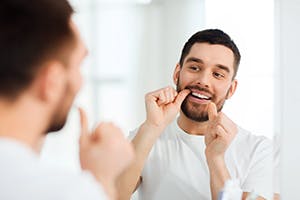Forgetting to brush your teeth infrequently or skipping flossing for a couple of days may not seem like a big deal at first. However, your oral hygiene can indirectly affect your hearing health.
Keeping Bacteria at Bay
Brushing twice a day keeps the bacteria in your mouth under control. Poor oral hygiene may cause tooth decay and gum disease, inflaming the tissue and bones in your jaw. Those infections introduce bacteria into your bloodstream and can affect your body, including your ears.
Heart Health and Circulation
Bacteria-induced inflammation narrows your veins and arteries, which can adversely affect your heart health and reduce blood circulation.
Studies have linked poor oral hygiene to an increased risk for heart and circulation issues. A 2016 study conducted by researchers at the University of Helsinki found people with “untreated teeth” were 2.7 times more likely to develop acute coronary syndrome, or sudden reduced blood flow to the heart.
Oral, Heart and Hearing Health
The delicate hair cells in your ears responsible for converting sound into electrical stimuli for your brain rely on good circulation to function correctly. A lack of blood flow causes them permanent and exacerbates hearing loss.
Illness and inflammation make it difficult for your heart to pump oxygen-rich blood to your ears, and without a steady blood supply, your ears can’t perform at their best.
Your upper sinuses and ears are closely linked to your oral health. Oral infections can easily spread to your sinuses, which puts your ears at greater risk for inflammation as well. Swelling and fluid buildup cause conductive and sensorineural hearing loss.
Implementing good oral hygiene practices, like regular brushing and flossing, will lower your risk of infection and protect your ears.
The team at Hearing Associates can determine the cause of your hearing loss, including poor oral hygiene. Call 888.760.2032 or contact us online to schedule your appointment.


